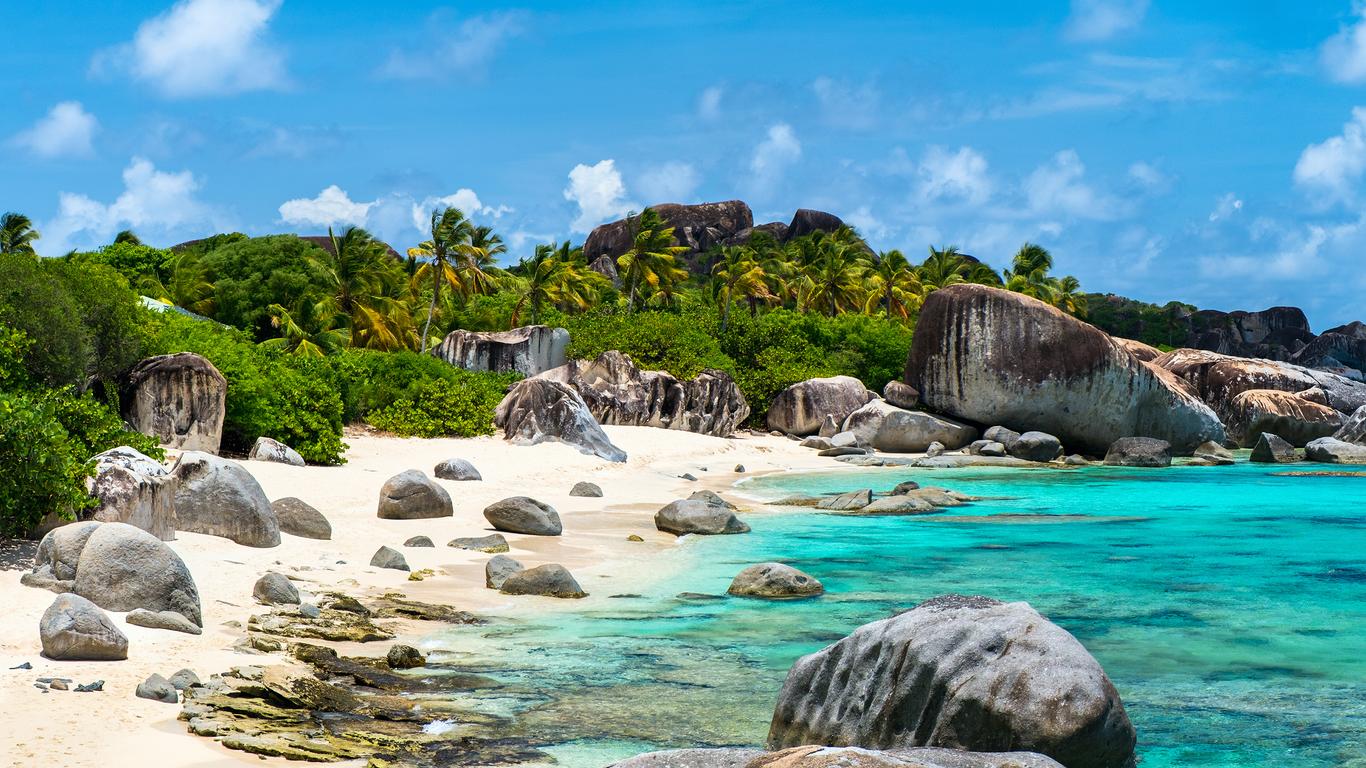
British Virgin Islands travel guide
British Virgin Islands Tourism | British Virgin Islands Guide
You're Going to Love British Virgin Islands
The British Virgin Islands are renowned across the globe for having some of the most idyllic sailing conditions that feature consistent winds and calm tides. There's an everlasting number of sheltered coves and sandy beaches to discover, while coral reefs exhibit thriving underwater ecosystems. Locals are extremely welcoming and there's always an opportunity for a cocktail at one of the barefoot beachside bars.
What to do in the British Virgin Islands
1. Check Out The Baths
Spectacular granite rock formations rise out of the water and provide an incredible backdrop to view from the beach.
2. Scuba Dive at RMS Rhone
The 310 ft ship was sunk during a hurricane in 1867 and offers an exciting site to explore with coral growing across the bow and full.
3. Hike Through Sage Mountain National Park
Several paths navigate the 92-acre reserve, including a track to the 1,716 ft volcanic peak that is the highest point of the British Virgin Islands.
4. Discover Normal Island
Located at the southern edge of the islands, it's a fantastic place to snorkel with a maze of caves and scaling cliff faces.
5. Watch the Ships at Tortola Pier Park
The bayfront park has sweeping views of ships sailing into Road Town as well as boutique shops and trendy bars.
When to visit the British Virgin Islands
A sub-tropical climate makes vacation pleasant throughout the year, however, it's nicest between December and April as temperatures hover around 83°F.
How to Get to the British Virgin Islands
Entry requirements
Citizens of the United Kingdom, the United States, Japan, Canada, and the European Union have visa exemption and can enter freely with a valid passport. One-month visas can be obtained by other nationalities upon arrival, ensuring that ongoing tickets and adequate means of support are documented.
Plane
The majority of international flights arrive at Beef Island Airport with connections from Puerto Rico (for travelers coming from the United States and Canada), Saint Martin (travelers coming from Europe), and Antigua (travelers coming from the United Kingdom). Regional airlines, such as interCaribbean Airways, LIAT, and VI Airlink, help facilitate services and a non-stop fare from San Juan can be bought for around $200-300. It's also common for visitors from the United States to fly to St. Thomas in the U.S. Virgin Islands and then travel by ferry.
Boat
The 50min ferry from Charlotte Amalie in St. Thomas to Road Town operates roughly between 8:30 am and 5:00 pm, with a one-way fare costing approximately $25. It's also possible to travel to West End wharf on Tortola. The ferries are passenger only and do not allow vehicles onboard.
Popular airlines serving the British Virgin Islands
Where to stay in the British Virgin Islands
Large hotels are available on Tortola, though most tourists prefer to stay in beachside resorts or bungalows. Smaller islands, such as Josh Van Dyke and Virgin Gorda, have fewer options but villas and budget accommodation can still be found.
Where to stay in popular areas of the British Virgin Islands
Most booked hotels in the British Virgin Islands
How to Get Around the British Virgin Islands
Public Transportation
There are no public buses, however, unofficial safari trucks navigate Tortola and provide hop-on-hop-off transport for roughly $3-5.
Car
Only on the larger islands that have sizeable populations, such as Tortola and Virgin Gorda, is it possible to rent a car. Beef Island Airport has several rental agencies, meaning visitors can pick up a car as soon as they land. Driving cautiously is recommended due to steep hills and inconsistencies in road quality.
Plane
Nonstop flights can be caught between Virgin Gorda and Beef Island. Flight times are less than 30min and priced at roughly $100-150.
Boat
Ferries can be caught to Jost Van Dyke, Virgin Gorda, Marina Cay, and Scrub Island. Services depart and return to Road Town multiple times each day and a round trip costs roughly $55-65. Water taxis are also readily available from docks and can take passengers to remote bays and beaches.
The Cost of Living in the British Virgin Islands
Eating out at an inexpensive restaurant costs approximately $15-20, while a dozen eggs can be bought from the market for roughly $3. A 30-day prepaid sim card can be purchased for about $45 with 3GB of data. Credit cards are widely accepted across the British Virgin Islands, though it's always best to carry cash for ferries and grocery stores.